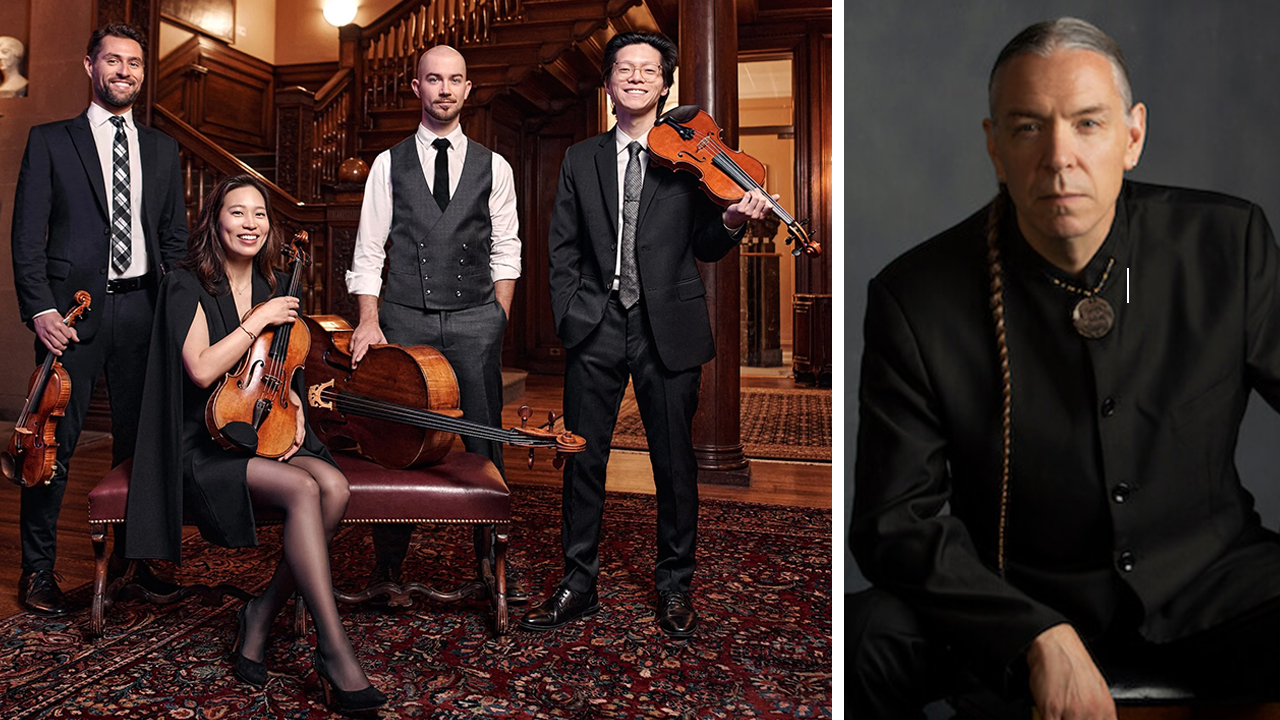We have thousands of human-written stories, discussions, interviews and reviews from today through the past 20+ years. Find them here:
For the Record, Op. 346: Dover Quartet, Lelie Cristea, Antje Weithaas, Hongyi Mo
Welcome to "For the Record," Violinist.com's weekly roundup of new releases of recordings by violinists, violists, cellists and other classical musicians. We hope it helps you keep track of your favorite artists, as well as find some new ones to add to your listening! Click on the highlighted links to obtain each album or learn more about the artists.

The Dover Quartet and composer Jerod Impichchaachaaha' Tate.
Woodland Songs
Dover Quartet
Joel Link, violin
Bryan Lee, violin
Julianne Lee, viola
Camden Shaw, cello
Jerod Impichchaachaaha' Tate, composer
This album is, at its heart, an exploration of the rich inheritance of music from the North American continent, with Dvorak's "American" Quartet alongside the world premiere recording of two works by Chickasaw-American composer Jerod Impichcha_achaaha' Tate: "Woodland Songs," and his orchestration for string quartet of "Rattle Songs," by the Indigenous singer-songwriter Pura Fé Crescioni, a founding member of the Native women's a cappella group Ulali. Dvorák composed his String Quartet No. 12 in F major, "American," in 1893, while vacationing in a Czech immigrant community in Spillville, Iowa, his aim being to identify an "American" sound. Dvorák was drawn to the music of Native and African American traditions, blending them with his own musical roots. Commissioned by the Dover Quartet, "Woodland Songs" (Abokkoli' Taloowa') is about traditional woodland animals revered in Chickasaw culture, where family clans are named after them; each animal has a special ethos: Squirrel, Woodpecker, Deer, Fish, and Raccoon. "Each movement is...a deep, dramatic, and rhapsodic expression of my feelings of being a Chickasaw man from a beautiful and robust culture," Tate said. "I love our animals, and I love composing works about them." BELOW: Trailer for the album.
Carpathian Tales
Lelie Cristea, violin
Maxim Shamo, piano
Swonderful Orchestra, Catherine Larsen-Maguire conducting
"It has always been my wish to explore my roots and shine a light on Romanian music and culture," said violinist Lelie Cristea, whose new album features George Enescu’s Violin Sonata No. 3; "Suite in Romanian Style" by Dumitru Bughici, her father’s teacher; as well as two Étude-Caprices by her grandfather, Ionel Cristea; as well as an assortment of other short pieces by Anghelus Dinicu, Ion Scarlatescu, Jo Knümann, Mircea Chiriac, Ciprian Porumbescu and Grigoras Dinicu. "The musical treasures I discovered during my research truly surprised me and far exceeded my expectations." BELOW: Trailer for the album.
Dvorák Violin Concerto & Serenade for Strings
Antje Weithaas, violin and conductor
Camerata Bern
On the one hand, Dvorák’s violin concerto is a large-scale symphonic tapestry for soloist and orchestra; in contrast, his Serenade has a strong chamber music feel to it. Written in 1875 and premiered in 1876, the Serenade is among Dvorák’s most popular works. On the perhaps less well-known violin concerto from 1879m Antje Weithaas said, "It’s a gorgeous piece, but difficult to play. Tricky passages await the soloist right at the beginning. No violinist feels at ease when going onstage to play this concerto! But the musical content is magnificent, and we should all do justice to this work by rising to the challenge.” Weithaas was awarded the German Record Critics' Annual Prize in 2024 for her complete recording of Beethoven's sonatas, and this fall she will receive the Opus Klassik 2025 award as Instrumentalist of the Year. BELOW: Dvorák: Violin Concerto in A Minor, Op. 53, B. 108: III. Finale. Allegro giocoso, ma non troppo.
Métamorphoses: Poulenc on Violin and Piano
Hongyi Mo, violin
John Etsell, piano
The text of Francis Poulenc's songs imbues intense emotions into his music - this fact inspired the award-winning violinist Hongyi Mo to transcribe ten of Poulenc's songs for violin and piano. These transcriptions, along with Poulenc's oboe and violin sonatas, are captured on a new recording performed by Mo with pianist John Etsell. "The core intent of this album is to lead listeners into an overlooked but profoundly important aspect of classical instrumental music: its inherent literary quality," Mo said. "In Poulenc’s art songs, the poetry deeply influences the performer’s approach to melody, harmony, and imagery in ways that are both profound and unique." Since 2008 Hongyi Mo has been a member of the Detroit Symphony Orchestra, where he regularly serves as guest principal second violin. BELOW: Banalités, FP 107: No. 2, Hôtel (transcribed for violin and piano by Hongyi Mo).
If you have a new recording you would like us to consider for inclusion in our "For the Record" feature, please e-mail Editor Laurie Niles. Be sure to include the name of your album, a link to it and a short description of what it includes.
You might also like:
- For the Record, Op. 345: Mikhail Pochekin, David Russell, Duo FAE
- For the Record, Op. 344: Curtis Stewart; Stanley Grill
- For the Record, Op. 343: Miró Quartet; Zina Schiff
* * *
Enjoying Violinist.com? Click here to sign up for our free, bi-weekly email newsletter. And if you've already signed up, please invite your friends! Thank you.
Replies
This article has been archived and is no longer accepting comments.












